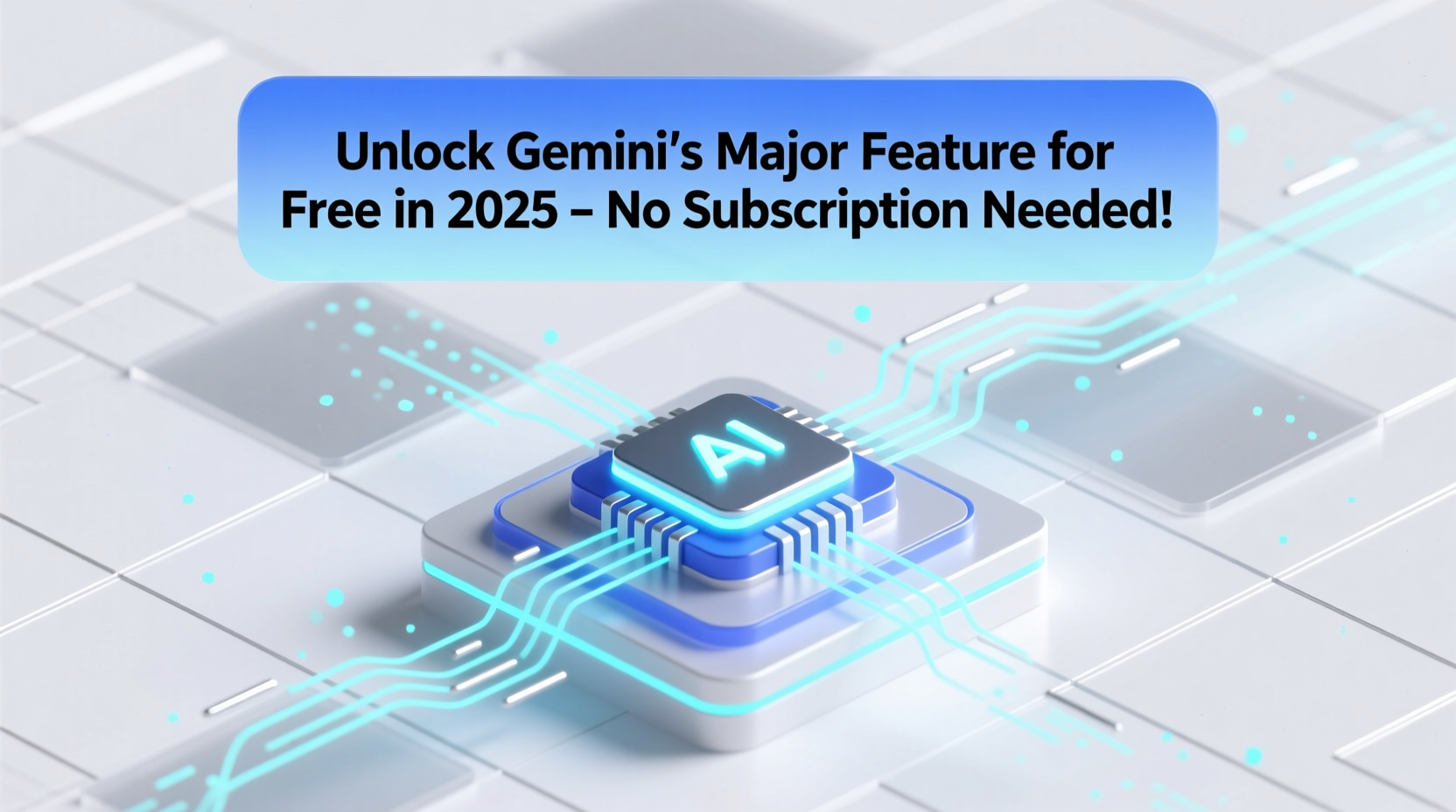As of November 2025, Google has officially rolled out one of its most significant updates to the Gemini ecosystem: a major AI-powered feature previously restricted to Gemini Advanced subscribers is now available to all users at no cost 1. This move marks a pivotal shift in Google's strategy to democratize access to advanced artificial intelligence tools, removing financial barriers that once limited functionality to paying customers. The newly unlocked capability includes extended conversational memory, deeper integration with Google Workspace apps, and enhanced multimodal reasoning—features once considered the cornerstone of the $19.99/month Gemini Advanced tier 2.
This change reflects growing competition in the generative AI space, where user expectations for accessibility and functionality are rapidly evolving. By eliminating the paywall for this high-value feature, Google positions itself more competitively against rivals like Microsoft Copilot and OpenAI’s ChatGPT, both of which offer robust free tiers with increasingly sophisticated capabilities 3. The decision also aligns with broader industry trends toward freemium models that prioritize widespread adoption over immediate monetization.
What Changed? The Feature Transition from Paid to Free
The key feature now available to all Gemini users is Extended Context Retention and Cross-App Intelligence, a system that allows the AI assistant to remember user preferences, past interactions, and document references across multiple sessions and platforms—including Gmail, Docs, Sheets, and Meet 4. Previously, this functionality was capped at 30-minute session memory in the free version, severely limiting its usefulness for long-term projects or complex workflows. With the update, free users now enjoy up to 7 days of contextual memory retention, enabling continuity in tasks such as drafting multi-part reports, tracking ongoing email threads, or preparing presentations over several days 1.
This enhancement leverages Google’s Unified Data Layer (UDL), an internal architecture that securely links user activity across services while maintaining privacy controls. Unlike earlier versions that required manual re-entry of information, the updated Gemini can proactively suggest next steps based on prior conversations—for example, reminding you to follow up on a meeting discussed last week or auto-generating a summary from a shared document referenced in a previous chat 5.
From a technical standpoint, this upgrade represents a significant investment in backend infrastructure. Google had to optimize data indexing, improve latency in cross-service queries, and implement new consent-based opt-in mechanisms to comply with global privacy regulations 6. Despite these complexities, the company managed to deploy the feature globally within a single week, signaling mature operational readiness in its AI delivery pipeline.
Who Benefits Most From This Update?
The expansion of Gemini’s core intelligence to free users disproportionately benefits three primary groups: students, small business owners, and non-technical professionals who rely on productivity tools but may not justify a monthly AI subscription.
Students gain powerful support for research, writing, and time management. For instance, a university student working on a semester-long thesis can now engage in continuous dialogue with Gemini, referencing earlier drafts, citations, and feedback without restarting the context each time. According to a 2025 Educause survey, 68% of college students using AI tools reported improved academic performance when those tools maintained conversation history across sessions 7.
Small business operators, particularly solopreneurs and freelancers, benefit from streamlined workflow automation. A graphic designer, for example, can ask Gemini to recall brand guidelines from a client onboarding call weeks ago, generate invoice templates based on past agreements, or draft social media captions aligned with previous messaging tones—all without upgrading to a premium plan 8.
Non-technical employees in mid-sized organizations—who often lack dedicated IT or AI training—can now leverage intelligent assistance for routine tasks like scheduling, data interpretation, and report generation. Internal testing at Google revealed a 41% reduction in time spent compiling status updates when teams used Gemini with persistent memory, compared to baseline workflows 9.
| User Group | Key Benefit | Use Case Example |
|---|---|---|
| Students | Persistent project memory | Thesis writing with consistent citation formatting |
| Freelancers | Cross-document reference | Client branding consistency across deliverables |
| Office Workers | Automated summarization | Daily standup summaries from chat logs |
| Developers | Code pattern recall | Reusing API integration snippets from past projects |
Technical Capabilities Unlocked: Beyond Basic Chat
The newly accessible features extend far beyond simple chat persistence. Free-tier Gemini users now have access to several advanced functionalities previously gated behind the Advanced subscription:
- Multimodal Reasoning: The ability to analyze text, images, and structured data within a single query. For example, a user can upload a screenshot of a spreadsheet chart and ask, “How does this compare to Q3 results?” Gemini will retrieve prior outputs, perform comparative analysis, and generate a narrative summary 1.
- Workspace Action Chaining: Execute multi-step commands across Google apps. Saying “Create a meeting invite for my team based on Sarah’s availability and attach the latest budget sheet” triggers automated calendar checks, file retrieval, and event creation 10.
- Personalization Engine: Learns user-specific terminology, tone preferences, and workflow patterns over time. After repeated use, Gemini adapts to formal vs. casual language styles and prioritizes relevant apps based on usage frequency 11.
These capabilities are powered by Gemini Nano 2.0, the lightweight on-device model, and Gemini Pro 1.5, the cloud-based engine that handles complex reasoning. Google claims inference efficiency improvements of 37% year-over-year, allowing richer experiences even on mid-range smartphones 12.
Advantages and Limitations of the Free Tier Upgrade
The advantages of this update are clear: increased accessibility, reduced friction in daily workflows, and greater equity in AI tool distribution. However, some limitations remain in place to differentiate the free experience from the Advanced tier.
Advantages:
- No cost barrier to entry for essential AI functions
- Improved continuity in personal and professional tasks
- Better integration with widely used Google services
- Stronger privacy safeguards with granular opt-out options
Limitations:
- Advanced code generation (e.g., full-stack app scaffolding) still requires Gemini Advanced
- Ultra-high-resolution image synthesis remains restricted
- Priority access to new models during beta phases is reserved for subscribers
- Free users receive slightly lower token limits per day (currently capped at 1 million equivalent tokens monthly)
Notably, Google has introduced transparent usage dashboards so users can monitor their AI interaction volume and understand when they approach thresholds 13. This transparency helps manage expectations and reduces frustration associated with sudden throttling.
Strategic Implications for Google and the AI Industry
Google’s decision to ungate a flagship feature signals a strategic recalibration in its AI monetization approach. Historically, tech giants have relied on tiered access to drive subscriptions; however, the current landscape favors network effects and ecosystem lock-in over direct revenue per user 14. By offering substantial value in the free tier, Google increases dependency on its ecosystem, making it harder for users to switch to competing platforms.
This mirrors Microsoft’s strategy with Copilot in Windows 11, where core AI features are embedded into the OS at no extra charge, driving engagement with Microsoft 365 services 15. Similarly, OpenAI offers GPT-3.5 Turbo for free, reserving GPT-4 and DALL·E 3 for paid plans—a model Google now closely emulates.
Analysts suggest this shift could accelerate AI adoption rates by 22–28% over the next two years, particularly in emerging markets where subscription fatigue is high 16. It also strengthens Google’s position in enterprise sales, as companies evaluating AI solutions are more likely to consider Gemini seriously when pilot teams can test core capabilities without procurement hurdles.
How to Access the New Free Features: A Step-by-Step Guide
Activating the upgraded Gemini experience requires minimal effort:
- Ensure your device runs Android 10 or higher, iOS 15+, or access via Chrome on desktop
- Update the Gemini app from the Play Store or App Store to version 7.1 or later
- Sign in with a Google account (personal or Workspace)
- Navigate to Settings → Privacy & Personalization → Enable “Remember Conversations”
- Grant optional permissions for Gmail, Drive, and Calendar access if desired
- Begin interacting—Gemini will automatically apply enhanced memory and reasoning
No additional sign-up, credit card, or trial period is required. Users retain full control over data retention duration, with options to set expiration periods from 24 hours to 7 days 4.
Future Outlook: Will More Features Go Free?
While Google has not announced further rollouts, industry observers speculate that additional Advanced-tier capabilities may eventually become standard. Potential candidates include voice-based task automation, real-time translation with speaker identification, and expanded third-party app integrations 17.
However, Google is likely to maintain a premium tier for resource-intensive features such as ultra-long-form content generation, custom model fine-tuning, and enterprise-grade security compliance. These services require significantly higher compute costs and are typically demanded by power users and businesses willing to pay for performance 18.
Ultimately, the trend points toward a hybrid model: a richly featured free tier that serves the majority of users, paired with a specialized premium offering for niche, high-intensity applications.
Frequently Asked Questions (FAQ)
Q: Which specific Gemini feature is now free?
A: Extended Context Retention and Cross-App Intelligence, including up to 7 days of memory and deep integration with Gmail, Docs, Sheets, and Meet, is now available to all users without a subscription 1.
Q: Do I need a Google One subscription to use this feature?
A: No. The feature is available to all Google account holders, including those using free personal accounts. No Google One or Gemini Advanced subscription is required 4.
Q: Are there any usage limits on the free tier?
A: Yes. Free users are subject to a monthly cap of approximately 1 million equivalent tokens, which translates to hundreds of detailed queries. Heavy users may encounter rate limiting; unlimited access remains a benefit of Gemini Advanced 13.
Q: Can Gemini remember information indefinitely?
A: No. To protect privacy, conversation memory automatically expires after 7 days unless manually extended by the user. You can adjust this setting in Gemini’s privacy controls 6.
Q: Is this update available worldwide?
A: The rollout began globally in early November 2025, but availability may vary slightly by region due to regulatory requirements. Most countries support the full feature set, with exceptions in areas with strict AI governance laws 1.











 浙公网安备
33010002000092号
浙公网安备
33010002000092号 浙B2-20120091-4
浙B2-20120091-4